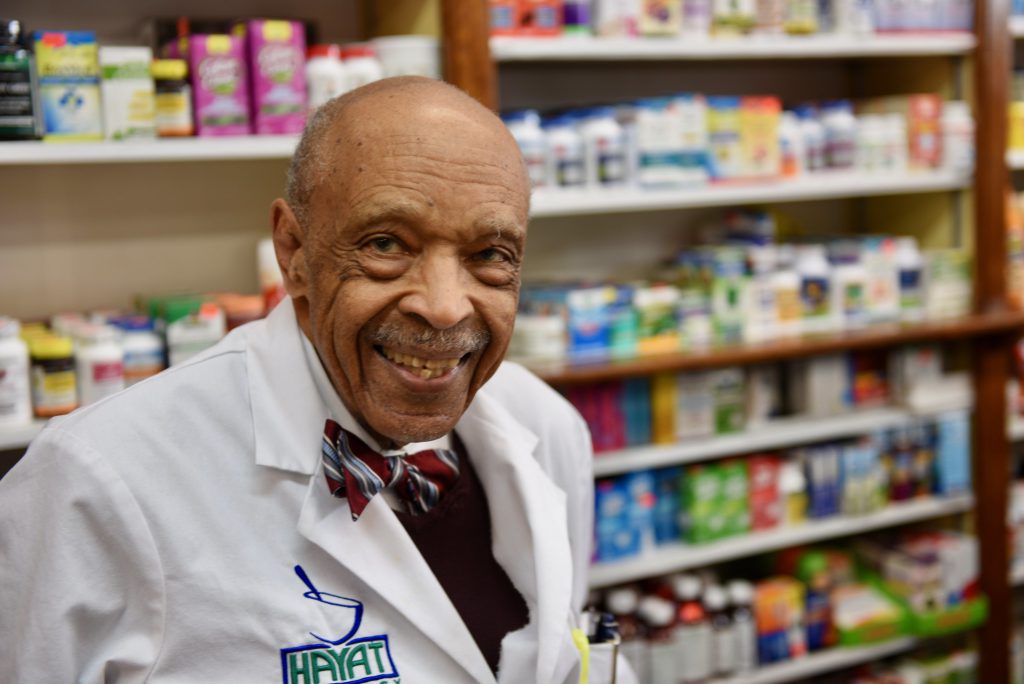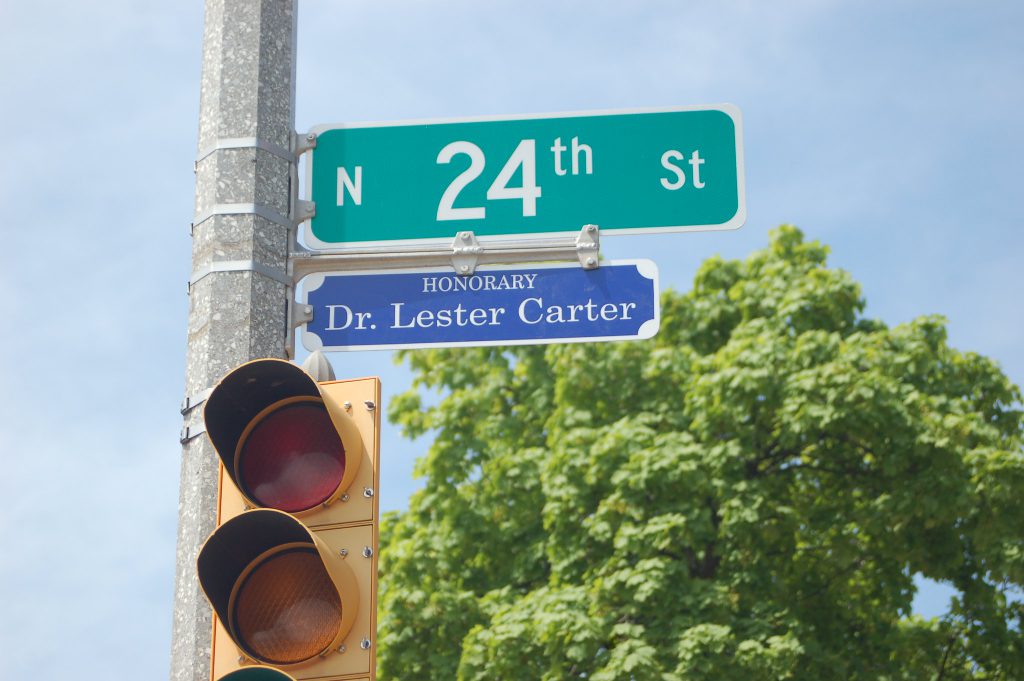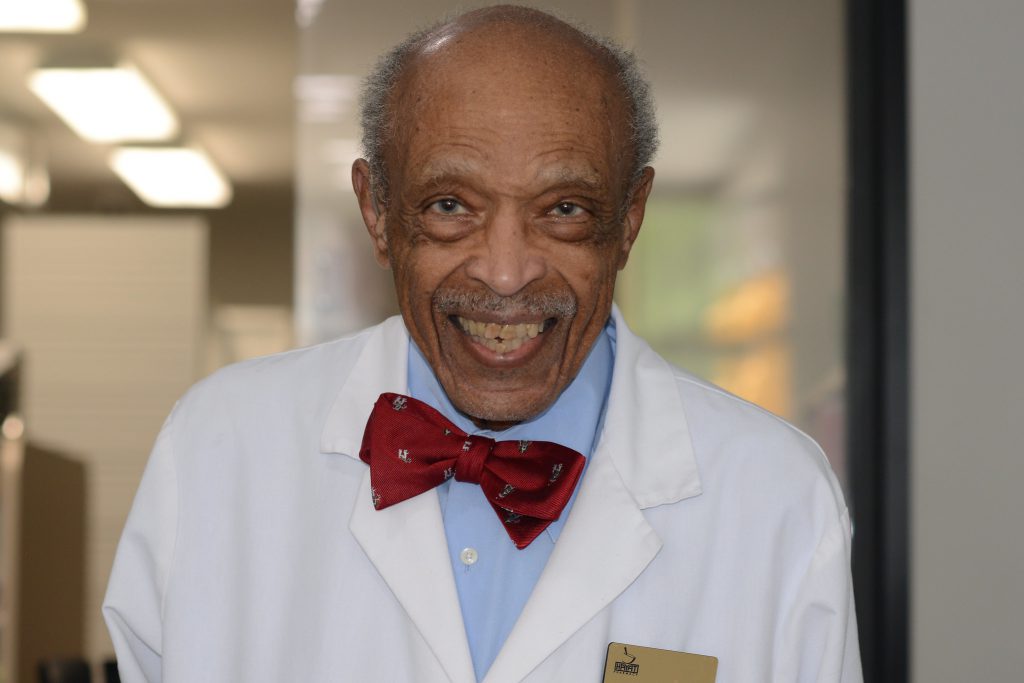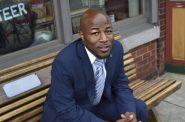Dr. Lester Carter, a Community Anchor for 47 Years
He says he's "just the community druggist," but he's much more than that.

Dr. Lester Carter turns 90 next month. “I’m just the community druggist, nothing fancy,” he says. But our columnist disagrees. File photo by Sue Vliet/NNS.
The unassuming brick building on the corner of North 24th and West Burleigh streets holds decades of warm memories for Black and brown people in the 53206 ZIP code.
And especially for me.
When I step inside, I close my eyes and am immediately enveloped by the smell of vitamins and fresh buttered popcorn.
Carter Drug Store was my family’s first pharmacy.
Things are a little different from visits past. This time, we both wear masks and we elbow-bump instead of hug.
It feels good to see him.
You can’t talk about community without talking about Dr. Carter, a Black pharmacist serving the Milwaukee community for over five decades.
The beginning
His story begins in his home state of Nebraska as the only child of parents who didn’t finish grade school.
His first job at age 14 was working as a “house boy” in a swank resort in Lake Okoboji, Iowa. He was charged with teaching rich white children how to swim. There was only one problem: He had to first learn how to swim himself. He went through a lifeguard program and spent the next four summers doing just that. He liked the water so much he joined the U.S. Navy.
Dr. Carter took an aptitude test after boot camp, and it showed he’d be good in medicine. He was sent to corpsman’s school in Portsmouth, Virginia, for training in health care.
After finishing, he was assigned to the USS Tortuga for two and a half years.
His job, he says, “was to keep the sailors straightened out.”

Dr. Carter has been an anchor in the community for over five decades. In 2018, the city honored his efforts by recognizing him with an honorary street sign at North 24th and West Burleigh streets. File photo by Jenny Whidden/NNS.
After four years in the Navy, he was discharged in 1954 and decided to go to pharmacy school. Through the GI bill, he attended Creighton University in Omaha, Nebraska. There were 42 people in his program, he says, and he was the only African American.
During his junior year, Dr. Carter was hired by one of the biggest pharmacy names in the country, Rexall. The pharmacy was located in one of the richest and whitest neighborhoods in Omaha. His job? To mop the floors, clean the shelves and run a 20-seat fountain.
“You don’t act mad, you just suck it all in. This is the type of atmosphere that I came up in,” Dr. Carter says. “The government paid my tuition, but I had to live. I had to pay rent
Dr. Carter graduated in 1958. He was now a pharmacist, but Rexall didn’t know what to do with him.
“We can’t have a Black pharmacist in a rich white store. It’s unheard of,” he recalls officials saying.
The store came up with a solution by creating a space in the back where Dr. Carter could not be seen. The managers put him in charge of compounding prescriptions.
It suited him well because it was something he wanted to learn how to do as he waited for his opportunity to take over the entire pharmacy, which he would do six years later.
‘You know there’s a Black guy working in the pharmacy?’
Dr. Carter became friends with a Black pharmacy owner in Nebraska. This friend knew of a pharmacist in Milwaukee who needed relief help when taking time off for vacations.
After filling in for several weekends, Dr. Carter was offered a permanent position at the store. The owner offered to pay all of his moving expenses if he agreed to take the job. So Dr. Carter decided to give it a shot.
He looked for his own store and heard about a pharmacy on North 24th and West Burleigh that was owned by a German pharmacist and his wife who were looking to retire. The community at the time was also heavily German.
“So, I go over to the store,” Dr. Carter recalls, “The wife greets me and says: ‘You that Carter guy?’ I say, “Yes, ma’am.” She said: ‘Arthur is in the back.’ I’m this skinny little Black guy from Nebraska, and he’s this big German fella.
“He looked at me and I looked at him. We shook hands. And that was the sale of the store. No lawyers, no banks. In those days, when you looked a man in the eye, and you said I’ll do this or that, it was like a legal document,” Dr. Carter says.
Many in the community didn’t know how to take Dr. Carter initially. He said some customers would ask the former owner, “You know there’s a Black guy working in the pharmacy? He said, ‘Yeah, I work with him every day.’ ”
Over time the neighborhood warmed up to him, and the women would offer him lunch or baked goods as a thank you.

During his time on Burleigh Street, Dr. Carter has seen many children grow up and become adults. And they continue to stop in and visit. Some have even become pharmacists because of his influence. File photo by Sue Vliet/NNS.
Growing up with Dr. Carter
I developed my own relationship with Dr. Carter’s drug store when I was young.
I was diagnosed with epilepsy at age 2, and Dr. Carter was my first pharmacist. I grew up on North 21st and West Locust streets, just five blocks from the store. My mother would pick up my prescription for Phenobarbital from his store for many years.
Once I was old enough to walk to the store on my own, I would go there for popcorn and freeze pops. There was a popcorn machine immediately to the left when you’d first enter the store. The smell would hit you as soon as you opened the door.
Dr. Carter would be behind the high-rise countertop with his pleasant demeanor. Always nice, with a smile.
He owned his store for 47 years, and though his famous sign no longer hangs outside, he still works part time as the pharmacy’s herbal specialist.
He sells 12 formulas that are his original compounds: one for regrowing hair after suffering from alopecia to one that gets rid of razor bumps or keloids, a common problem in Black skin. “The preparations I have put together have not been surpassed.”
His best health advice:
“Lose weight. About 70% -80% (of African Americans) are overweight and, of that, 20% are obese. That is one of the main reasons we are prime candidates for this virus COVID-19 and a whole host of other health problems like diabetes and high blood pressure,” he says. “Fast food is some of the worst there is. We need to get back to cooking meals.”
I asked Dr. Carter what the best part of his career has been.
“The whole career has been very good to me,” he says. “I went to one of the best schools in the country and then to get a store of my own for 47 years. I still got a reasonable amount of health. I don’t take any pills. I’m still here. When I go to the doctor, he just looks at me and says, ‘I’ll see you in six months.’”
On Aug. 10, Dr. Lester Carter will turn 90.
He says the community wants to give him a birthday party.
And then he waves his hand. “I’m just the community druggist, nothing fancy,” he says.
His eyes well up a bit as he looks back on his time in the community. He says, “When people ask me, ‘How’d you do all this Dr. Carter?’ I don’t know.”
He becomes quiet.
I tell him, “Don’t you make me cry. I love you, Dr. Carter, and I appreciate you. It was so good to see you today.”
He touches my shoulder and says, “It’s better to be seen than viewed.”
Yes, it is, Dr. Carter. We see you.
LIVING LEGENDS: ‘It’s better to be seen than viewed’: What I learned from my visit with Dr. Lester Carter was originally published by the Milwaukee Neighborhood News Service.
City People
-
New Public Allies Leader Comes Full Circle
 Nov 2nd, 2021 by Sam Woods
Nov 2nd, 2021 by Sam Woods
-
Reuben Harpole Found His Purpose
 May 13th, 2021 by PrincessSafiya Byers
May 13th, 2021 by PrincessSafiya Byers
-
Rick Banks Is A Man On A Mission
 Apr 23rd, 2021 by PrincessSafiya Byers
Apr 23rd, 2021 by PrincessSafiya Byers





















